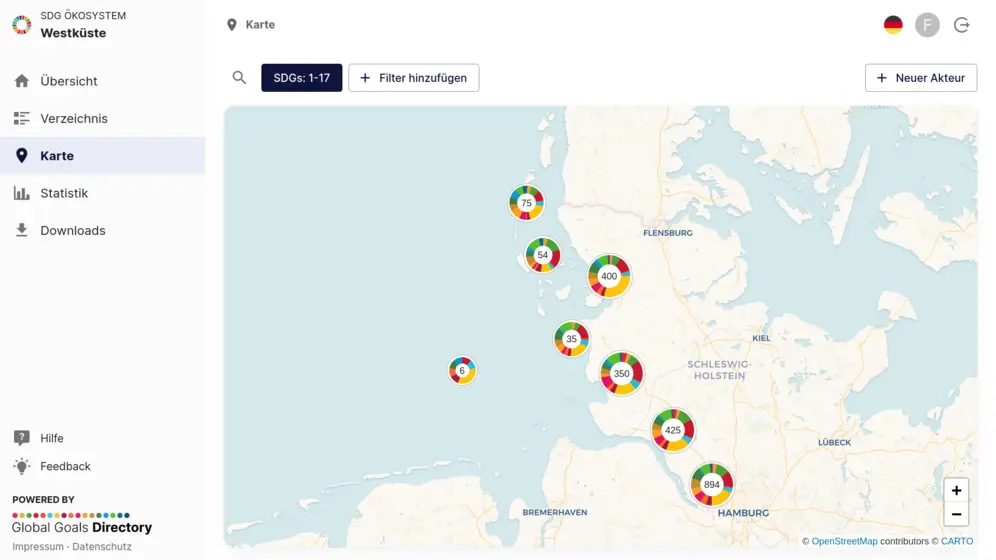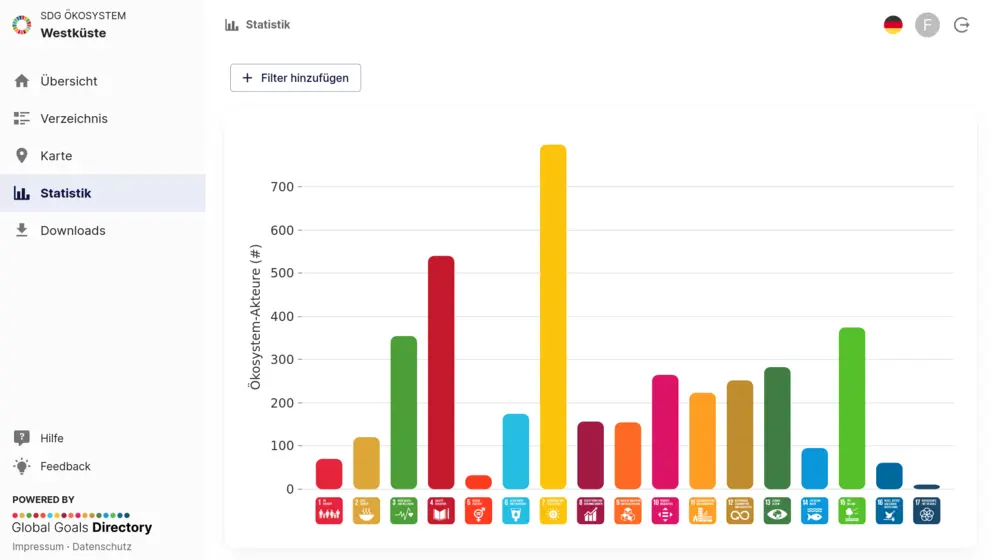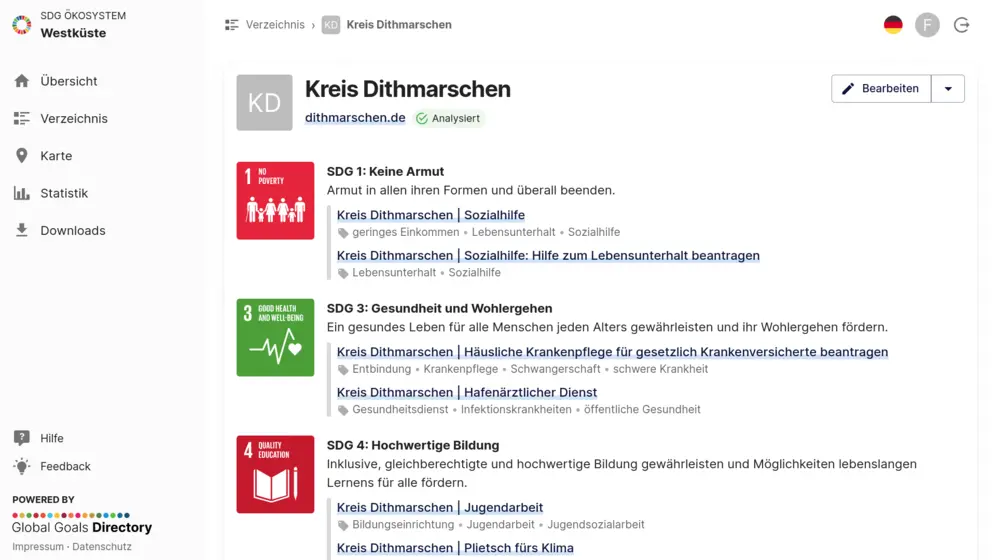Case study: WestküsteSDG
How can the economy on the west coast of Schleswig-Holstein become more sustainable?
West coast region
Schleswig-Holstein, Germany
1,517,342
Webpages analysed
May to Dec. 2023
Time period
15,732
Stakeholders identified
735,000
Population
2,281
Stakeholders with SDG focus



Strategy for a sustainable future in the region
The topic of sustainability has become increasingly important in recent years and has become a central concern for society and the economy.
Based on the Sustainable Development Goals (SDGs) of the United Nations, the German Federal Ministry for Economic Affairs and Climate Action has launched the national competition "Region of the Future".
The West Coast Regional Cooperation successfully applied with the project "WestküsteSDG: Sustainable business and action on the west coast of Schleswig-Holstein" and received funding to strengthen the sustainability of the regional economy.
Within the project WestküsteSDG, a concept for the future will be developed with the involvement of the regional economy. The concept will contain needs-based objectives and concrete implementation measures, which will be realised from 2025.
With the project WestküsteSDG, the West Coast Regional Cooperation pursues the goal of developing the economic structure of Schleswig-Holstein in a future-oriented and thus more sustainable manner. Through an extensive participation process, a concept for the future will be developed by October 2024.
— Nele Göttsche, Project Management, County of Dithmarschen
Diverse stakeholder landscape with many small and medium-sized enterprises
Around 735,000 people live in the West Coast region, a quarter of Schleswig-Holstein's population. The region's economy is characterised by small and medium-sized enterprises (SMEs) with fewer than 250 employees.
The many small and medium-sized enterprises pose a particular challenge for the promotion of sustainable business practices.
Large companies often have the financial resources to hire dedicated sustainability managers to deal with the issue of sustainability. This allows them to identify levers that make the company more sustainable.
Small and medium-sized companies, on the other hand, often lack the financial and human resources to deal with sustainability issues in detail.
Nevertheless, there are already numerous sustainability activities in line with the SDGs in the region — including by small and medium-sized enterprises. However, these are often not visible and limited in their effectiveness, as they take place sporadically and there is no network between the individual stakeholders and companies.
In order to promote sustainable business and action on the west coast of Schleswig-Holstein, all activities should be bundled, coordinated and strengthened. In addition, gaps are to be identified and supplemented by expanding measures.
In order to make this possible and measure the success of the multi-year project, a good overview of the stakeholder landscape of the west coast region and an overview of existing sustainability activities and projects is required.
15,000 stakeholders identified and analysed by AI
To support this work, the Global Goals Directory mapped over 15,000 regional stakeholders, identified local sustainability champions and compiled best practice examples.
The results were made available on our SDG Ecosystem web platform. They can be visualised, filtered and used individually in an interactive map. This makes it possible to identify both the regional sustainability pioneers and the companies that have made little or no progress towards sustainability or have not yet communicated about it.
For each stakeholder, there is a detailed profile with a list of the stakeholder's specific sustainability activities as well as important information such as contact details, stakeholder type and sector. This provides our project partners with an overview of what is already happening in the region and highlights existing projects and best practices.
We collected the data using our AI-based SDG ecosystem analysis, which identifies relevant actors and their contributions to the 17 Sustainable Development Goals. Local actors were first identified from various public sources, such as the commercial register, and then each actor's website was searched for sustainability-related projects and activities. In total, over 1,500,000 webpages were analysed.
Kick-off for sustainability
With our SDG ecosystem analysis, we were able to provide our project partners with a comprehensive overview of the majority of regional stakeholders.
On the one hand, this created a solid data basis for an inventory. The collected data shows, for example, which actors are already communicating about their contribution to sustainability and which SDGs are in focus and in the background. This will serve as a basis for future comparisons in order to track the development of sustainable business on the west coast.
Secondly, we have created a database that can be used to identify sustainability pioneers and their specific sustainability activities. Among other things, the project partners have used the information to hold thematic workshops to promote the circular economy, climate protection and equal opportunities.
The mapping of the regional SDG ecosystem played a decisive role in the development of the strategy for the future and provided us with key insights. We were able to identify outstanding companies and initiatives in our region as examples of best practice and encourage them to contribute to the project.
We also gained valuable insights into the previous sustainability communication of companies in our area. The principle of "do good and communicate it" will now also be part of our concept.
— Nele Göttsche, Project Management, County of Dithmarschen
Following these successes, the West Coast Regional Cooperation is now working on establishing a network for sustainable business and action. The network offers a contact point for all regional SMEs on the topic of sustainability — both for sustainability pioneers and for newcomers.
For example, the network will publish sustainable best practices and practical examples from companies in the region. Stakeholders can also network with each other and exchange ideas. The data from the ecosystem analysis will also provide support in this regard.
More information on the WestküsteSDG project and the new regional network for sustainable management and action can be found at https://www.westkuestesdg.de/